The ACOS (A Culture of Safety) Alliance is a coalition of more than 100 news organisations, freelance journalist associations and press freedom NGOs, working together to champion safe and responsible journalistic practices. Free Press Unlimited is one of the members of the ACOS Alliance.
In December 2020 the ACOS Alliance Annual Safety Coordination meeting took place. Safety trainings was among the topics that were discussed. Many of the organisations that are members of the ACOS Alliance provide safety trainings, but in 2020 they could not provide face-to-face safety trainings as usual as a result of the COVID-19 pandemic. Therefore, during the meeting the participants – mainly NGOs but also news organisations – both looked back on 2020, and looked forward to 2021, by discussing their main takeaways of 2020 in relation to the provision of safety trainings.
Looking back
All members had to adapt their initial safety training plans for 2020. Some initiatives were either cancelled or indefinitely postponed, but others were transitioned to online solutions and e-learning. However, the members had to also go through a learning process to find out which formats and platforms work best when providing online trainings, while also taking into account the digital safety of themselves and their participants. These new formats ranged from live topic-based webinars (either stand-alone or a series of webinars), to self-paced courses, to linking to existing resources.
Matters to take into account were the size of groups and the duration of sessions.It was sometimes difficult to keep participants engaged and to provide ongoing feedback during the trainings. Whereas the size of the group plays a big role in this, it can still be challenging to work around the participants’ ‘Zoom fatigue’. Furthermore, not all topics lend themselves to an online format. Topics such as first-aid and self-defence are allegedly more suitable for in-person trainings.
There have also been positive sides to transitioning to online trainings. First of all, it has been easier to reach out to groups that are remote or for any other reasons difficult to reach. Second, online trainings can be more cost-effective as it is possible to reach a much broader group of people than typically possible.
Looking forward
It is very improbable that all safety activities will take place virtually post-pandemic, but it is not unthinkable a mix of offline and online activities will become more common. As mentioned before, online activities also bring along many opportunities, and might even lead to more in-depth learning and retention as it is easier to follow up with resources. However, it is of utmost importance that sufficient attention is devoted to digital safety.
The COVID-19 pandemic has shed more light on the importance of self-care and psycho-social well-being, and it is imperative that psycho-social safety is more and more included in safety trainings. This constitutes not only dealing with traumas (either first-hand or second-hand, as in the case of vicarious trauma), but also dealing with chronic stress and burn-outs, for example resulting from media outlets’ financial struggles. Furthermore, safety initiatives need to respond to current safety trends, such as covering protests and public disorder, and online abuse and harassment.
Many ACOS Alliance members agreed that it is very important to focus on the risk assessment as the base unit of the training. This should go hand in hand with introducing new media professionals to safety from the onset.

